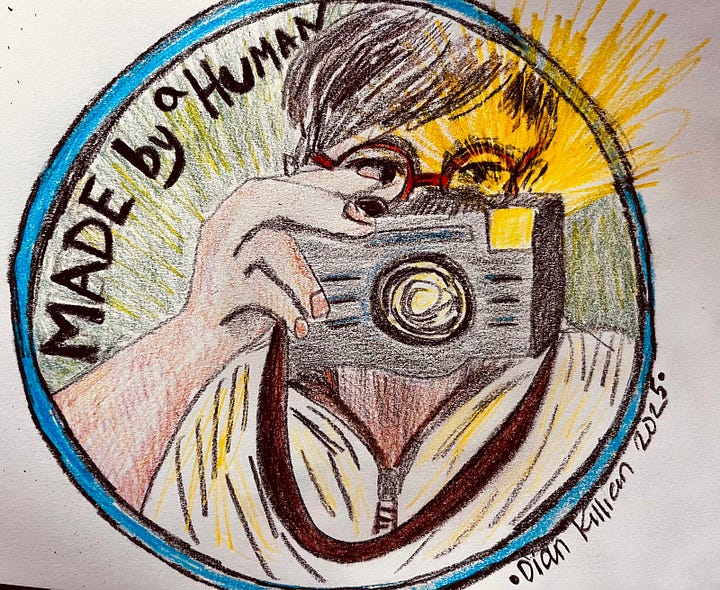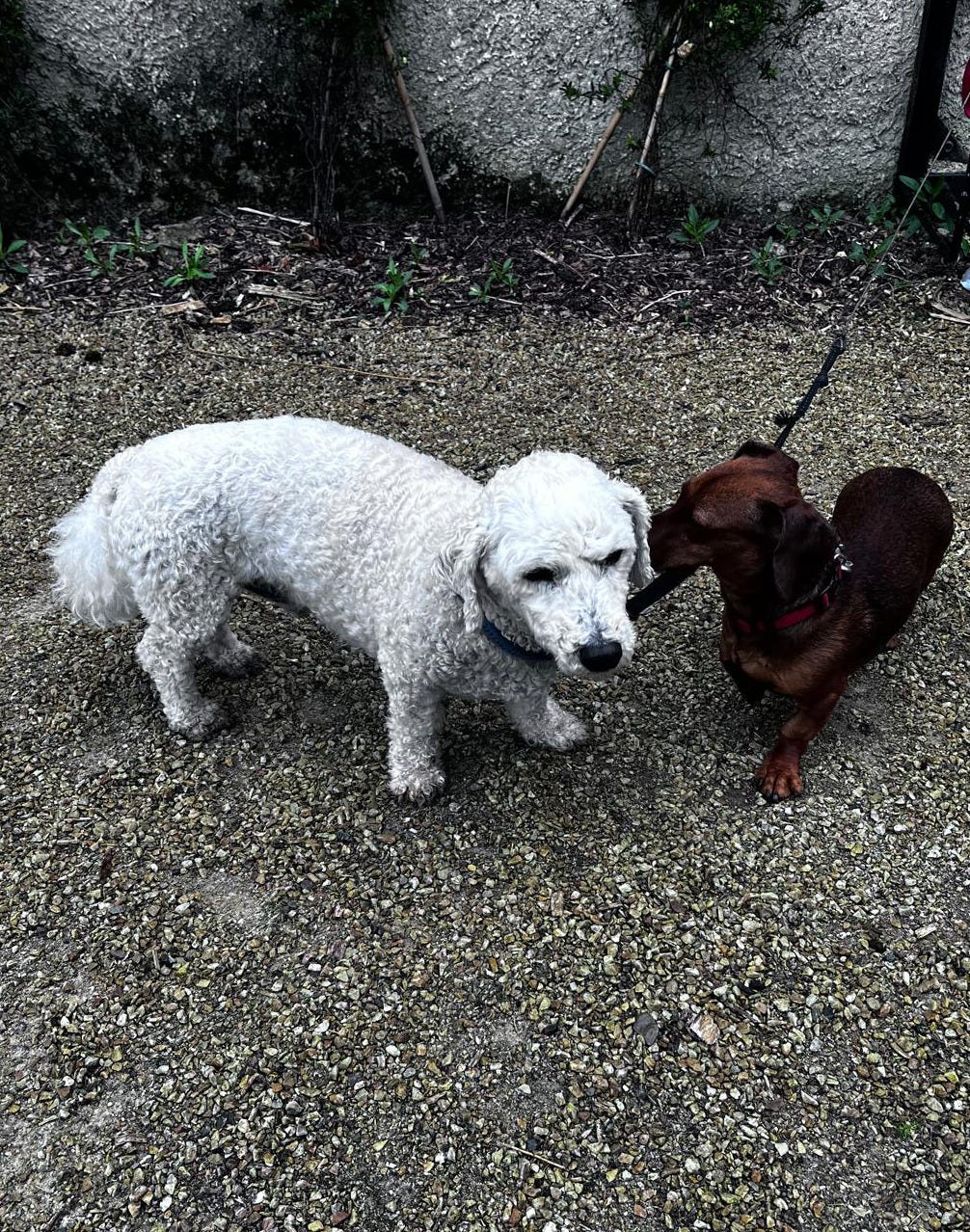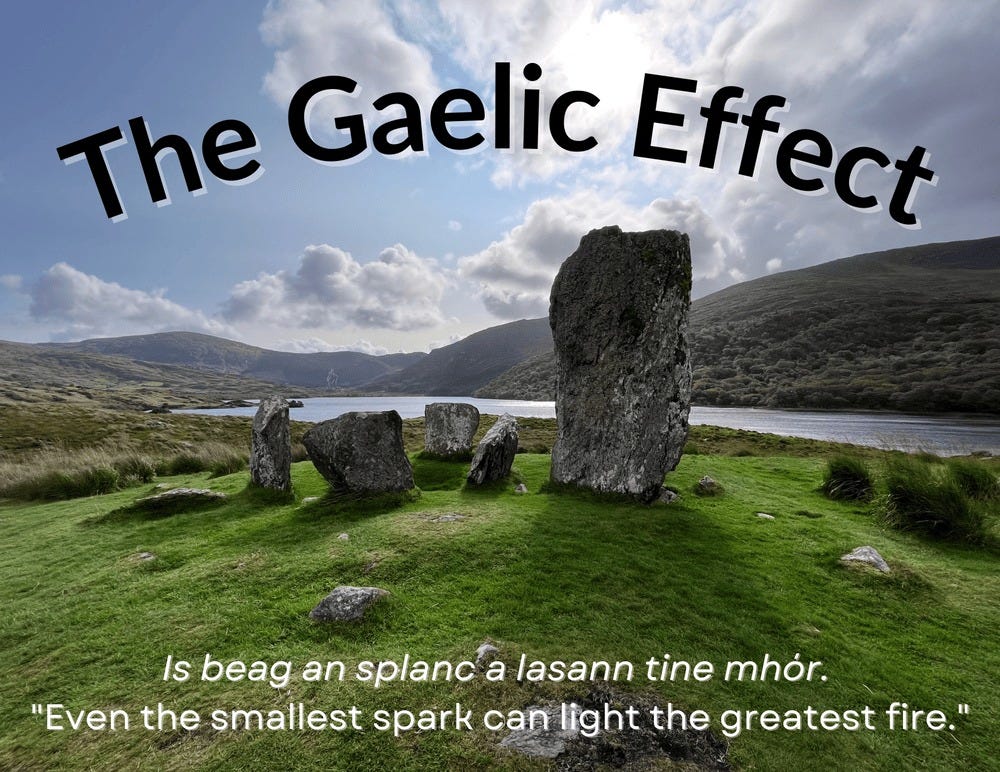Failte go dtí An Éifeacht Ghaelach! Welcome to The Gaelic Effect!
First, a few notes…
If you missed it, I recently enjoyed a lively chat with Mollie (of Irish with Mollie) on her podcast. Being called “her hero” totally made my day!
I also talked with Paola Bassanese about Irish language and culture, and what brought us to Ireland.
Also, The Gaelic Effect will be gifting three copies of a book I very much enjoy by Effie Brush, who’s also a subscriber. The book, We will Never be Together is a prose-poem illustrated with “found paper art” (collage) by Effie reflecting on her life. The drawing takes place on the Summer Solstice, June 21st. All paid subscribers to The Gaelic Effect will be entered to win! (BTW, you can upgrade to paid for just $3.50 per month.)
And now it’s time for this week’s Gaelic Effect—more lingustic archeology. Remember to read in the app for the best visual experience.
Half a story
When I first heard gabh mo leithscéal (“excuse me”), the synapses in my brain lit on fire. “Leath” means “half”and “scéal” means “story”—so “excuse” in Irish means “half a story!” I love decoding etymology in this way—from the surface-meaning of words. “Half a story” also seemed perfect to me: a compact and highly efficient way of describing what an “excuse” actually is. Irish offers exquisate observations, telling an entire story in one word. In this case, it does it with half a story.
Excuse me?
Unlike in English, there’s no verb for “excuse” in Irish (as in “excuse me”). It’s a noun—hence the phrase gabh mo leithscéal, “gabh” meaning “to take” or accept (i.e., please accept my half-story). Leithscéal can also mean apology, plea or pretext (Teanglann). It’s also used in different idiomatic phrases. It can mean “makeshift,” as in “bhí leithscéal pinn agam,” I had a makeshift pen (a half-story pen) or leithscéal de sheift (a makeshift or “half-story” device). Leithscéal de rud is a poor specimen (a half story of something) and “níl ann ach leithscéal de dhuine” is someone who’s only half a story—i.e., only an apology for a man. Consistently, leathscéal is used when something is less than a hundred percent—i.e., only half there.
While already not the full monty, there are numerous expressions with leithscéal that means a subpar excuse—poor, lame or insufficient: leithscéal bacach (bacach meaning a lame person or beggar); leithscéal bocht (bocht, a poor person); leithscéal cam (cam, a melting pot—so literally your half story is melting away). Leithscéal a bhfuil a thóin leis is another inferior excuse: it’s an excuse (half story) that “has a bottom or backside (tóin) to it.” My favorite is, “leithscéal agus a leathbhéal faoi.” “Leathbhéal” means out of the side of the mouth: leath (half) + béal (mouth)—so literally talking with half your mouth. (Teanglann) So leithscéal agus a leathbhéal faoi means, in effect, “half a story with half your mouth.” I think that sums up a poor excuse.
“Words Are Windows (or They’re Walls)
I feel so sentenced by your words,
I feel so judged and sent away,
Before I go I’ve got to know,
Is that what you mean to say?
Before I rise to my defense,
Before I speak in hurt or fear,
Before I build that wall of words,
Tell me, what did I really hear? —Marshall B. Rosenberg
Instant insight
When people make excuses, they usually are wanting to protect themselves from blame. In English, “excuse” comes from Middle English through Old French and ultimately from Latin: excūsō, excūsāre (“to excuse, allege in excuse, literally, free from a charge”). Consistent with this, as a transitive verb, where one person is excusing another, “excuse” means to forgive, pardon, or overlook. (“I excused him his transgressions.”) This is similar usage to “be excused”—to allow to leave, or be released from any obligation, be it at the table (“Can I be excused?” or “Excue me, I need to step out…”), or to be excused from school, court or some other obligation. From this usage, we also get, “I excused myself from the proceedings to think over what I'd heard.” (Wiki) This in effect is releasing onself from obligation—having a reason or excuse for the choice you made.
As explored in previous Gaelic Effects, there are numerous words in English that go back to punishment, obligation, judgment and demand. Sadly, “thank you” in English originated in forgiving literal debt (see Debt or Adundance); “sorry” often has a quality of guilt and shame, unlike tá brón orm in Irish which is an expression of actual feelings of sadness or sorrow (see A True Feeling). The last issue of The Gaelic Effect explored how dangerous a concept “should” is and how in Irish there is no direct translation for this concept (see Don’t Should on Me). In Irish, rather than “should,” you say that this would be “good with me”—not in a selish way (as in, “it’s good for me”); rather, it sits (or “feels”) “right” to you. A reader reminded me that one way to express this in Irish, cóir, actually means natural balance; it has even deeper resonance in indigenous Irish culture since traditionally the high king (an t-ard-rí) needed to show his “rightness” (cóir) to maintain the favor of the Goddess/land. This is a beautiful way to remember “right relationship” with onself and the earth and hold accountable those in structural power. You can hear some of these concepts briefly explored in this video about the poet Ella Young (thanks to
for sharing):Bíonn cead cainte ag fear caillte na himeartha.—It is a loser’s privilege to make excuses.
The other half of the story
It’s compelling to me in this context that there is no verb for “excuse” in Irish. This suggests that the power-dynamics that we see in English language culture—around exoneration and release from obligation (see above) simply does not exist or function in the same way in indigenous Irish culture. That there are so many ways to say “excuse” as a noun (a “half-a-story”) and so many ways to say that it’s also a lame or poor “half-story” (in addition to the above, you can also simply say leithscéal dona, a bad excuse), suggests that there’s no shortage of excuses (and poor excuses) being made. Yet it’s significant that excuse in Irish means “half a story.”
According to Google AI:
“This seemingly odd translation reflects the idea that an excuse is often presented as only part of the truth, a partial explanation, rather than the full and complete story. It suggests that an excuse might be a way of avoiding responsibility. This phrase subtly suggests that an excuse is often a partial narrative, not the whole truth, which aligns with the common perception that excuses are often used to avoid full accountability or to present a more favorable account of events. In essence, the Irish word captures the idea that an excuse is a partial representation of a situation, a way of "telling half a story" to cover up the full truth or to avoid responsibility.” (Google)
I agree that “half-story” suggests a partial narrative —that’s why I love this phrase and and find it so descriptive. Yet I disagree that it suggests a lack of responsibility. While “half a story” acknowledges we are not getting the full version, by naming this directly we acknowledges it to ourself and the person we’re speaking to. Both the person giving the half-story—and the person being asked to accept it—know exactly what it is. It’s stated up front. There’s some honesty and integrity here. More, we’re also not in a power-over dynamic where one person is being asked to be excused or pardoned by the other. If you think about the relationship between the noun and verb in English, an excuse is a way to get excused/forgiven. Instead, when it’s “half a story,” it’s not about being excused. For me, there’s greater awareness and responsibility all ‘round (and more shared power) when sharing a “half-story.”
Half baked
Why do we tell half-stories (give excuses)? I think the main reason is we have a need for understanding and acceptance. We want to protect ourselves from blame and disconnection with others. Usually when we’re giving an excuse, we’re feeling self-conscious or apprehensive; we are often judging ourselves or fearing judgment from others. The excuse offers context and an explanation. It’s a way of saying, in effect, “Please see my best intentions—even though things didn’t work out the way I’d hoped or planned. I regret that.” It’s an attempt for empathy—and restoration. Of course on the receiving end sometimes excuses sound defensive and hollow. This reflects how “sorry” has come to be used in English-speaking culture (again see A True Feeling) and how we’re operating in a power-over world. We have learned to anticipate judgment, blame and condemnation—and to engage in self-blame and shame. As Marshall Rosenberg points out:
“when people hear anything that sounds like criticism, they tend to invest their energy in self-defense or counterattack. If we wish for a compassionate response from others, it is self-defeating to express our needs by interpreting or diagnosing their behavior.”
As Marshall explores in this video, all this comes from the concept that human beings are innately evil; as such, humans need to be judged, controlled and punished—and to have contempt for ourselves. This is a tragic attempt to create change:
Blame offers a stark contrast to the concept of cóir—right relationship.
The full Monty
The next time you’re wanting to give “half a story” (an excuse), I invite you to sit with the full story. What actually happened on an observational level (i.e. you were late)? How do you feel about what happened and the potential impact (maybe sad, regretful, concerned or heavy hearted?). What are you needing now about this situation—maybe understanding and acceptance (empathy) or perhaps connection and reassurance—or perhaps simply information: to know about the impact was on the other person. Then you’re in a position to ask for what you really want—connection, reassurance, or information. For example, “So I’m curious about the impact on you—does this throw your day off?” or “How was it for you that I was 15” late today? That feedback would be helfpul for me.” Maybe there is less impact that you feared. Regardless, if there is disconnection and perhaps distrust, this offers an opportunity to address it and restore it.
That, in effect, completes the story.
GRMA (thank you) as always for reading and listening to my stories,
Dian, i mBaile Atha Cliath (in Dublin)
P.S. Friendly reminder for Irish learners: words as Gaeilge in the text above are hyperlinked to abair.ie so you can hear the pronunciation in the dialect of your choice.
You can also support The Gaelic Effect and its mission by making a one-time donation by clicking anseo (here).












The "half story" concept makes me think of "the dog ate my homework" type anecdotes. I have a lot of complex feelings about apologies, there were so many episodes in my childhood of apologies being demanded then being chided for them being insincere. This may help.
Scríobh tú alt álainn! Is aoibhinn liom é. Gabh mo leithscéal níos fearr ná "excuse me." Tá Gaeilge chomh álainn agus cineálta!